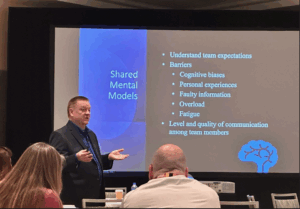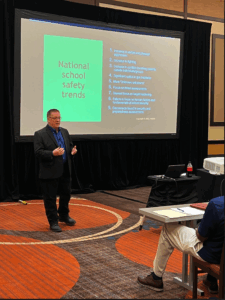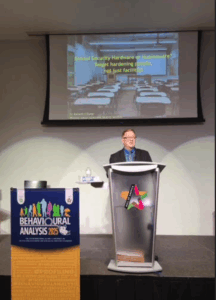Experienced School Safety Keynote, Seminar, and Professional Development Presenter
Dr. Kenneth S. Trump is a seasoned presenter, trainer, and educator capable of effectively communicating to diverse, multidisciplinary audiences.

He has more than 40 years experience speaking before audiences ranging from superintendents, principals, school board members, heads of independent schools, teachers, and school support staff to state and federal elected policymakers, professional association conference attendees, first responders, attorneys, academicians, and the media.
Our presentation services include keynote presentations, workshops and seminars, and facilitated school safety and crisis preparedness planning team meetings.
Be aware & prepared – not scared!!
CONFERENCE KEYNOTES AND SCHOOL STAFF PROFESSIONAL DEVELOPMENT TRAINING
Dr. Ken’s keynote, workshop, and school staff presentations are tailored to specific needs. Sample presentations include:

- School safety leadership in times of high ambiguity and uncertainty: Strategic crisis leadership and school safety communication lessons for school leaders
- Target hardening people, not just places: Boosting situational awareness, reducing human error, and strengthening cognitive decision making under stress
-
Building and sustaining effective school safety teams: From swarm response to structured teams—what makes teams functional, focused, and ready under pressure
- Proactive school security and emergency preparedness planning: Focusing on the fundamental, nuts-and-bolts proven best practices for managing school safety
Leadership program audiences may include superintendents, assistant superintendents, principals, cabinet and leadership teams, school board members, heads of independent or parochial schools, charter school heads, school communications executives, school security directors and chiefs, police chiefs and sheriffs.
Audience for frontline program staff may include principals, assistant principals, deans, school and district crisis teams, psychologists, counselors, social workers, support staff (facilities, food services, health services, office, transportation, etc.), central office administrators, communications directors and public information officers, school security directors and officers, School Resource Officers (SROs), first responders, and other community partners.
We believe in designing every program with the client and the target audience in mind. Our audiences have ranged from federal agency heads and state leaders to school bus drivers, secretaries, and parents. The ability to effectively address the needs of such diverse audiences, both individually and collectively, is one of the top factors contributing to the success of our programs.
In addition to public school districts, parochial schools, independent schools, regional education offices, and other schools nationwide, examples of organizations that have engaged Ken’s presentations include:

Education Association Conventions, Conferences, Workshops, and Seminars; Association conferences for Public Safety, Prevention, Communication, and Other Professional Associations: National School Boards Association (NSBA), American Association of School Administrators (AASA), National Association of Secondary School Principals (NASSP), National Association of Elementary School Principals (NAESP), National School Public Relations Association (NSPRA), Association of School Business Officials International (ASBO International), National Christian School Association, National PTA, National Association of Attorneys General (NAAG), National Governors Association, National Lieutenant Governors Association, National Association of School Resource Officers (NASRO), National Police Athletic/Activities Leagues (National PAL), Education Writers Association, Ohio School Boards Association, Ohio Schools Council, Ohio Association of Pupil Service Administrators, Ohio Education Association, Ohio PTA, Texas School Safety Center, Wisconsin School Safety Coordinators Association, Kentucky Prevention Network, Student Assistance Professionals Association of Georgia, Montana Behavioral Institute, North Central Association of Colleges and Schools, Michigan Schools Educators Police Liaison Association (SEPLA), Buckeye Association of School Administrators, Association of Nova Scotia Educational Administrators (ANSEA), Education Law Association, Ohio Catholic Education Association, and others.
Law Enforcement, Emergency Management, and Other First Responders: FBI National Academy, California Gang Investigators Association, Midwest Gang Investigators Association, MAGLOCLEN Law Enforcement Network, New Jersey State Police Street Gang Unit, Minnesota Juvenile Officers Institute, Missouri Police Chiefs Association, Indiana Governor’s Summit on Homeland Security, Ohio Office of Criminal Justice Services, Western Regional Institute for Community Policing, Michigan State Police – Emergency Management Division/Homeland Security, Wisconsin Department of Justice, Rhode Island Emergency Management Agency, Central Illinois Police Training Center, and more.
Governmental Entities and Public Policymakers: United States Senate (Health, Education, Labor, and Pensions Committee), United States House of Representatives (House Ed
ucation and Labor Committee), United States House of Representatives (House Homeland Security Committee), U.S. Commission on Civil Rights, U.S. State Department, U.S. Department of Defense Education Activity, Executive Office of the United States Attorneys, U.S. Attorney’s Offices in 10 states, U.S. Department of Justice,Hawaii Department of Education, Indiana Department of Education, Illinois Department of Education/Regional Offices of Education, South Carolina Department of Education, Arkansas Department of Education, Arizona Department of Education, Sandy Hook Advisory Commission, New Jersey School Security Task Force, Oklahoma Commission on School Security, Oklahoma State Regents for Higher Education, Council of State Governments, Education Commission of the States, City of Cleveland – Healthy Cleveland Sub-Committee on Violence, and others.
Academic: The Ohio State University’s Criminal Justice Research Center, University of Virginia, University of Wisconsin, Purdue University, Cleveland State University, Ohio University,Virginia Commonwealth University, and others.
School Safety Training Costs
Costs for training programs are based on the type of presentation, on-site time, preparation time, and travel time. Quotes are based on this information and will reflect speaking fee, preparation time, and customary expenses (travel, lodging, meals, etc.).
National School Safety and Security Services has rich, solid history in providing school leaders, policy-makers, parents, community members, and youth-service providers information on the latest trends and best practices in school security and emergency preparedness planning. We offer balanced, practical, cost-effective and common-sense approaches based on our front-line experience working with public and private K-12 schools in rural, suburban, and urban communities from all 50 states and internationally.
Contact Ken Trump to discuss your conference or training needs, costs, and related information!

